Queensland ACCHS: Primary Healthcare and Aboriginal Wellbeing (NSB202)
VerifiedAdded on 2023/06/10
|8
|2277
|265
Essay
AI Summary
This essay provides an overview of Aboriginal Community Controlled Health Services (ACCHS) in Australia, focusing on their crucial role in delivering culturally safe and effective primary healthcare to Aboriginal and Torres Strait Islander peoples. The essay explores how ACCHSs address systemic issues stemming from colonization and promote self-determination, holistic care, and cultural safety within the community. It examines the methods ACCHSs employ to deliver primary healthcare, including programs tailored to specific needs like mental health support and maternal care. The essay highlights the importance of cultural sensitivity, community engagement, and the empowerment of Aboriginal peoples in decision-making. It analyzes the ACCHS commitment to models of care, including community engagement, well-being, and the Aboriginal workforce, and their impact on individual, family, and community levels, as well as their role in promoting self-determination. The essay concludes by emphasizing the significance of ACCHSs in addressing health disparities and improving the overall well-being of Aboriginal and Torres Strait Islander communities.
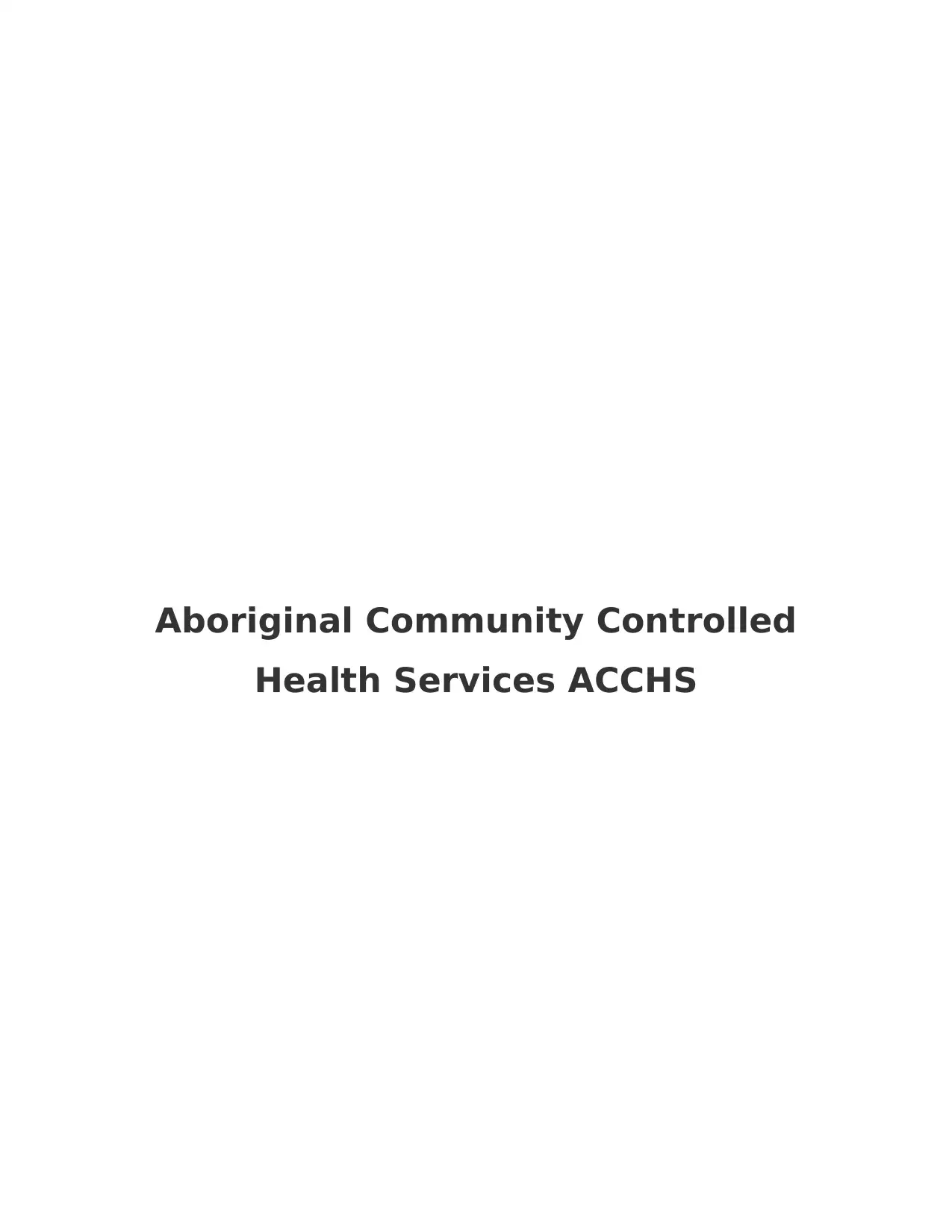
Aboriginal Community Controlled
Health Services ACCHS
Health Services ACCHS
Paraphrase This Document
Need a fresh take? Get an instant paraphrase of this document with our AI Paraphraser
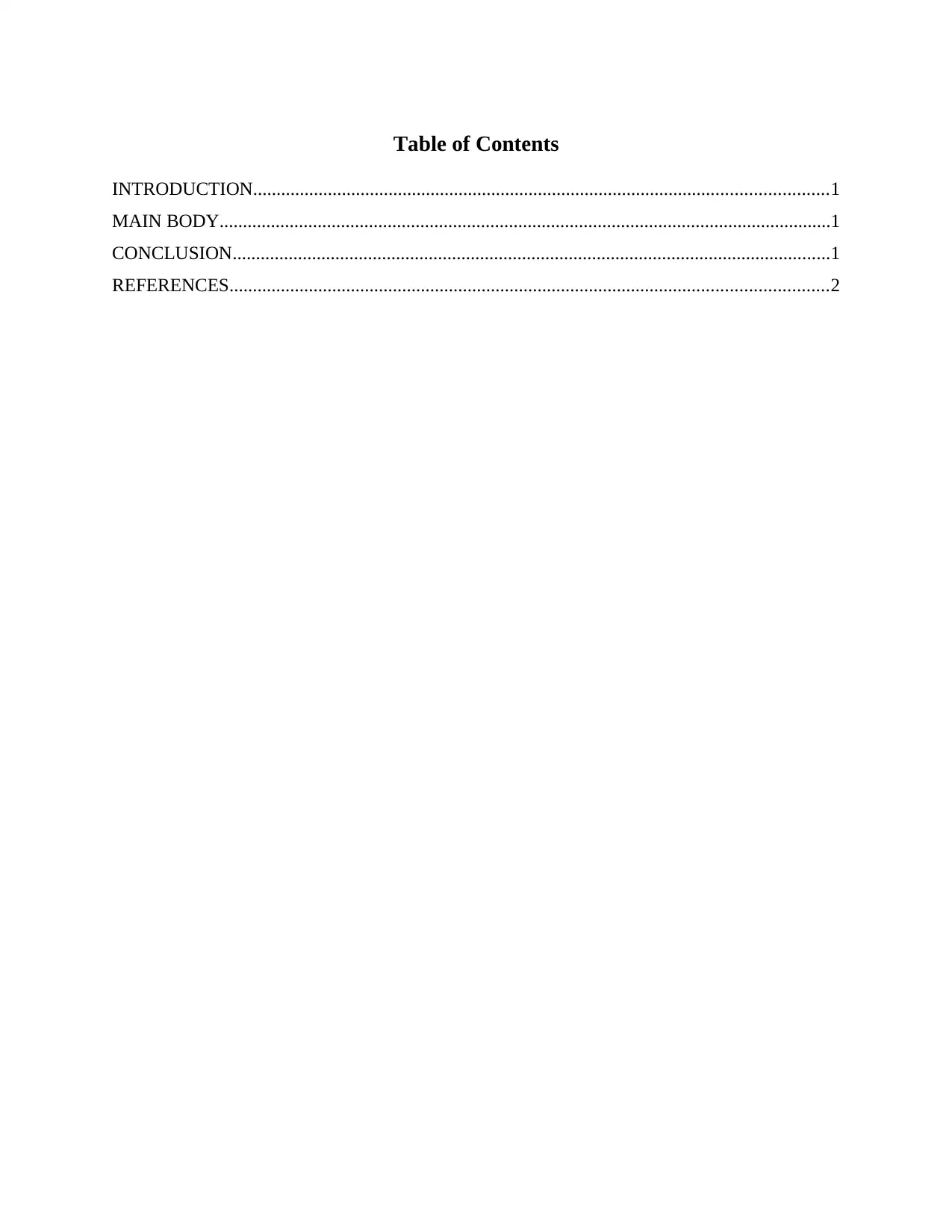
Table of Contents
INTRODUCTION...........................................................................................................................1
MAIN BODY...................................................................................................................................1
CONCLUSION................................................................................................................................1
REFERENCES................................................................................................................................2
INTRODUCTION...........................................................................................................................1
MAIN BODY...................................................................................................................................1
CONCLUSION................................................................................................................................1
REFERENCES................................................................................................................................2
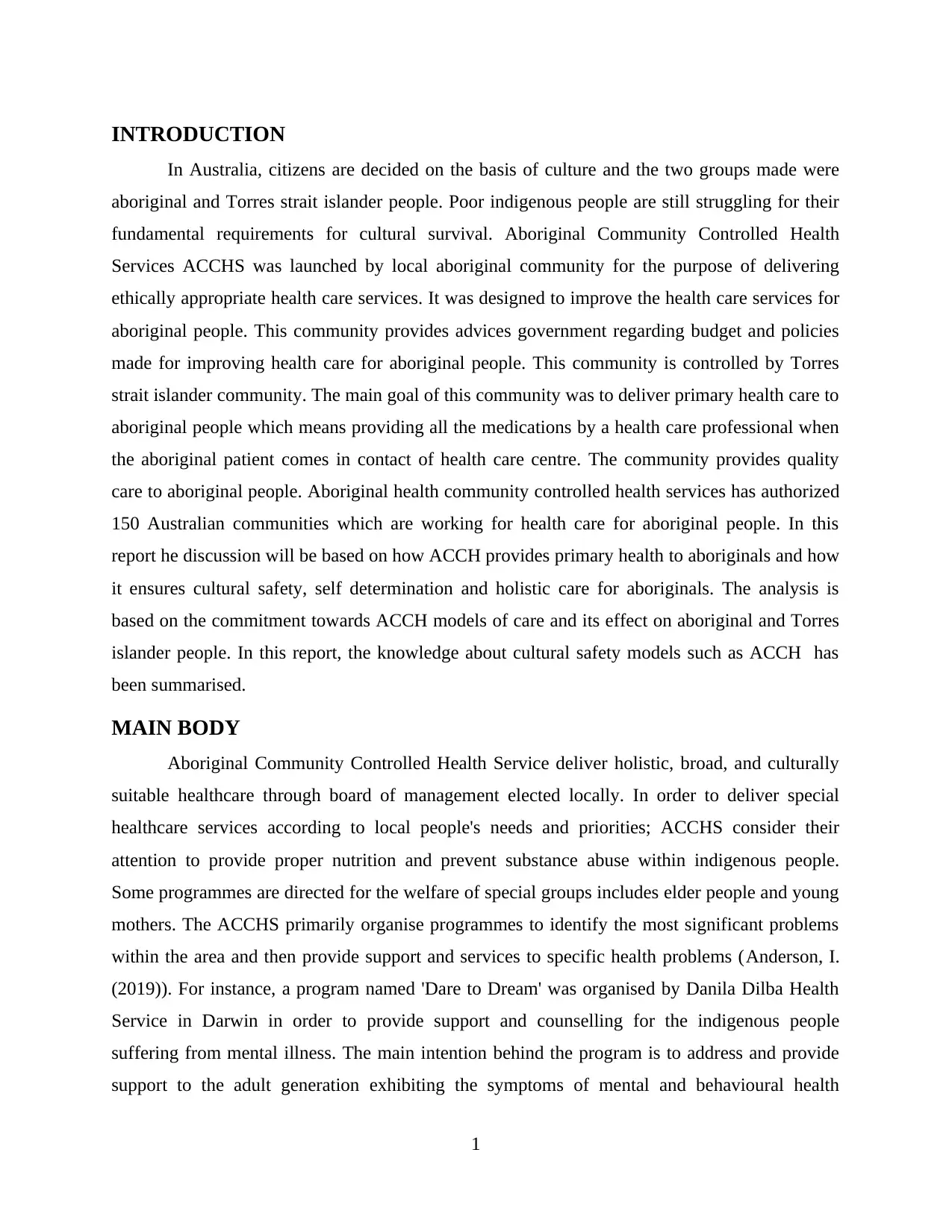
INTRODUCTION
In Australia, citizens are decided on the basis of culture and the two groups made were
aboriginal and Torres strait islander people. Poor indigenous people are still struggling for their
fundamental requirements for cultural survival. Aboriginal Community Controlled Health
Services ACCHS was launched by local aboriginal community for the purpose of delivering
ethically appropriate health care services. It was designed to improve the health care services for
aboriginal people. This community provides advices government regarding budget and policies
made for improving health care for aboriginal people. This community is controlled by Torres
strait islander community. The main goal of this community was to deliver primary health care to
aboriginal people which means providing all the medications by a health care professional when
the aboriginal patient comes in contact of health care centre. The community provides quality
care to aboriginal people. Aboriginal health community controlled health services has authorized
150 Australian communities which are working for health care for aboriginal people. In this
report he discussion will be based on how ACCH provides primary health to aboriginals and how
it ensures cultural safety, self determination and holistic care for aboriginals. The analysis is
based on the commitment towards ACCH models of care and its effect on aboriginal and Torres
islander people. In this report, the knowledge about cultural safety models such as ACCH has
been summarised.
MAIN BODY
Aboriginal Community Controlled Health Service deliver holistic, broad, and culturally
suitable healthcare through board of management elected locally. In order to deliver special
healthcare services according to local people's needs and priorities; ACCHS consider their
attention to provide proper nutrition and prevent substance abuse within indigenous people.
Some programmes are directed for the welfare of special groups includes elder people and young
mothers. The ACCHS primarily organise programmes to identify the most significant problems
within the area and then provide support and services to specific health problems (Anderson, I.
(2019)). For instance, a program named 'Dare to Dream' was organised by Danila Dilba Health
Service in Darwin in order to provide support and counselling for the indigenous people
suffering from mental illness. The main intention behind the program is to address and provide
support to the adult generation exhibiting the symptoms of mental and behavioural health
1
In Australia, citizens are decided on the basis of culture and the two groups made were
aboriginal and Torres strait islander people. Poor indigenous people are still struggling for their
fundamental requirements for cultural survival. Aboriginal Community Controlled Health
Services ACCHS was launched by local aboriginal community for the purpose of delivering
ethically appropriate health care services. It was designed to improve the health care services for
aboriginal people. This community provides advices government regarding budget and policies
made for improving health care for aboriginal people. This community is controlled by Torres
strait islander community. The main goal of this community was to deliver primary health care to
aboriginal people which means providing all the medications by a health care professional when
the aboriginal patient comes in contact of health care centre. The community provides quality
care to aboriginal people. Aboriginal health community controlled health services has authorized
150 Australian communities which are working for health care for aboriginal people. In this
report he discussion will be based on how ACCH provides primary health to aboriginals and how
it ensures cultural safety, self determination and holistic care for aboriginals. The analysis is
based on the commitment towards ACCH models of care and its effect on aboriginal and Torres
islander people. In this report, the knowledge about cultural safety models such as ACCH has
been summarised.
MAIN BODY
Aboriginal Community Controlled Health Service deliver holistic, broad, and culturally
suitable healthcare through board of management elected locally. In order to deliver special
healthcare services according to local people's needs and priorities; ACCHS consider their
attention to provide proper nutrition and prevent substance abuse within indigenous people.
Some programmes are directed for the welfare of special groups includes elder people and young
mothers. The ACCHS primarily organise programmes to identify the most significant problems
within the area and then provide support and services to specific health problems (Anderson, I.
(2019)). For instance, a program named 'Dare to Dream' was organised by Danila Dilba Health
Service in Darwin in order to provide support and counselling for the indigenous people
suffering from mental illness. The main intention behind the program is to address and provide
support to the adult generation exhibiting the symptoms of mental and behavioural health
1
⊘ This is a preview!⊘
Do you want full access?
Subscribe today to unlock all pages.

Trusted by 1+ million students worldwide
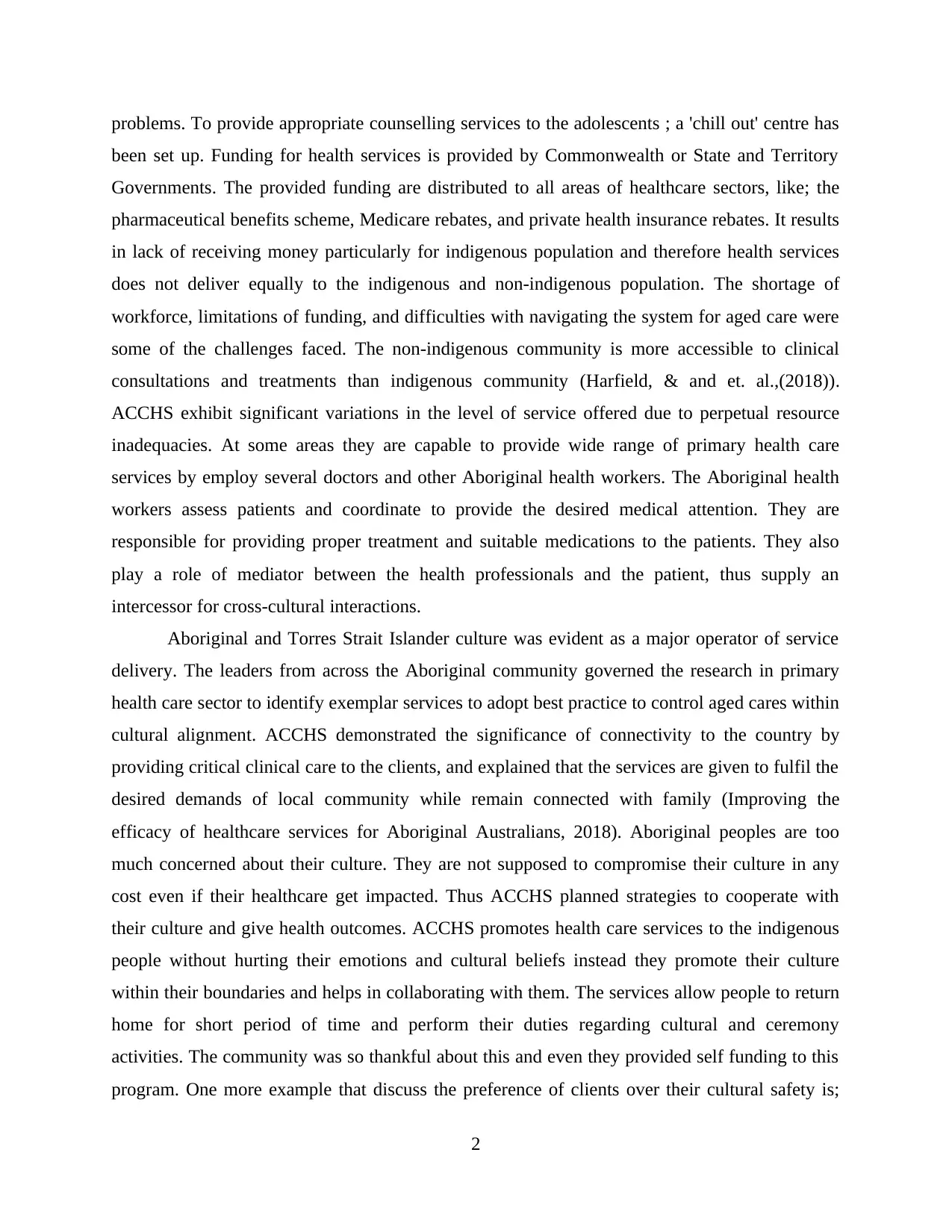
problems. To provide appropriate counselling services to the adolescents ; a 'chill out' centre has
been set up. Funding for health services is provided by Commonwealth or State and Territory
Governments. The provided funding are distributed to all areas of healthcare sectors, like; the
pharmaceutical benefits scheme, Medicare rebates, and private health insurance rebates. It results
in lack of receiving money particularly for indigenous population and therefore health services
does not deliver equally to the indigenous and non-indigenous population. The shortage of
workforce, limitations of funding, and difficulties with navigating the system for aged care were
some of the challenges faced. The non-indigenous community is more accessible to clinical
consultations and treatments than indigenous community (Harfield, & and et. al.,(2018)).
ACCHS exhibit significant variations in the level of service offered due to perpetual resource
inadequacies. At some areas they are capable to provide wide range of primary health care
services by employ several doctors and other Aboriginal health workers. The Aboriginal health
workers assess patients and coordinate to provide the desired medical attention. They are
responsible for providing proper treatment and suitable medications to the patients. They also
play a role of mediator between the health professionals and the patient, thus supply an
intercessor for cross-cultural interactions.
Aboriginal and Torres Strait Islander culture was evident as a major operator of service
delivery. The leaders from across the Aboriginal community governed the research in primary
health care sector to identify exemplar services to adopt best practice to control aged cares within
cultural alignment. ACCHS demonstrated the significance of connectivity to the country by
providing critical clinical care to the clients, and explained that the services are given to fulfil the
desired demands of local community while remain connected with family (Improving the
efficacy of healthcare services for Aboriginal Australians, 2018). Aboriginal peoples are too
much concerned about their culture. They are not supposed to compromise their culture in any
cost even if their healthcare get impacted. Thus ACCHS planned strategies to cooperate with
their culture and give health outcomes. ACCHS promotes health care services to the indigenous
people without hurting their emotions and cultural beliefs instead they promote their culture
within their boundaries and helps in collaborating with them. The services allow people to return
home for short period of time and perform their duties regarding cultural and ceremony
activities. The community was so thankful about this and even they provided self funding to this
program. One more example that discuss the preference of clients over their cultural safety is;
2
been set up. Funding for health services is provided by Commonwealth or State and Territory
Governments. The provided funding are distributed to all areas of healthcare sectors, like; the
pharmaceutical benefits scheme, Medicare rebates, and private health insurance rebates. It results
in lack of receiving money particularly for indigenous population and therefore health services
does not deliver equally to the indigenous and non-indigenous population. The shortage of
workforce, limitations of funding, and difficulties with navigating the system for aged care were
some of the challenges faced. The non-indigenous community is more accessible to clinical
consultations and treatments than indigenous community (Harfield, & and et. al.,(2018)).
ACCHS exhibit significant variations in the level of service offered due to perpetual resource
inadequacies. At some areas they are capable to provide wide range of primary health care
services by employ several doctors and other Aboriginal health workers. The Aboriginal health
workers assess patients and coordinate to provide the desired medical attention. They are
responsible for providing proper treatment and suitable medications to the patients. They also
play a role of mediator between the health professionals and the patient, thus supply an
intercessor for cross-cultural interactions.
Aboriginal and Torres Strait Islander culture was evident as a major operator of service
delivery. The leaders from across the Aboriginal community governed the research in primary
health care sector to identify exemplar services to adopt best practice to control aged cares within
cultural alignment. ACCHS demonstrated the significance of connectivity to the country by
providing critical clinical care to the clients, and explained that the services are given to fulfil the
desired demands of local community while remain connected with family (Improving the
efficacy of healthcare services for Aboriginal Australians, 2018). Aboriginal peoples are too
much concerned about their culture. They are not supposed to compromise their culture in any
cost even if their healthcare get impacted. Thus ACCHS planned strategies to cooperate with
their culture and give health outcomes. ACCHS promotes health care services to the indigenous
people without hurting their emotions and cultural beliefs instead they promote their culture
within their boundaries and helps in collaborating with them. The services allow people to return
home for short period of time and perform their duties regarding cultural and ceremony
activities. The community was so thankful about this and even they provided self funding to this
program. One more example that discuss the preference of clients over their cultural safety is;
2
Paraphrase This Document
Need a fresh take? Get an instant paraphrase of this document with our AI Paraphraser
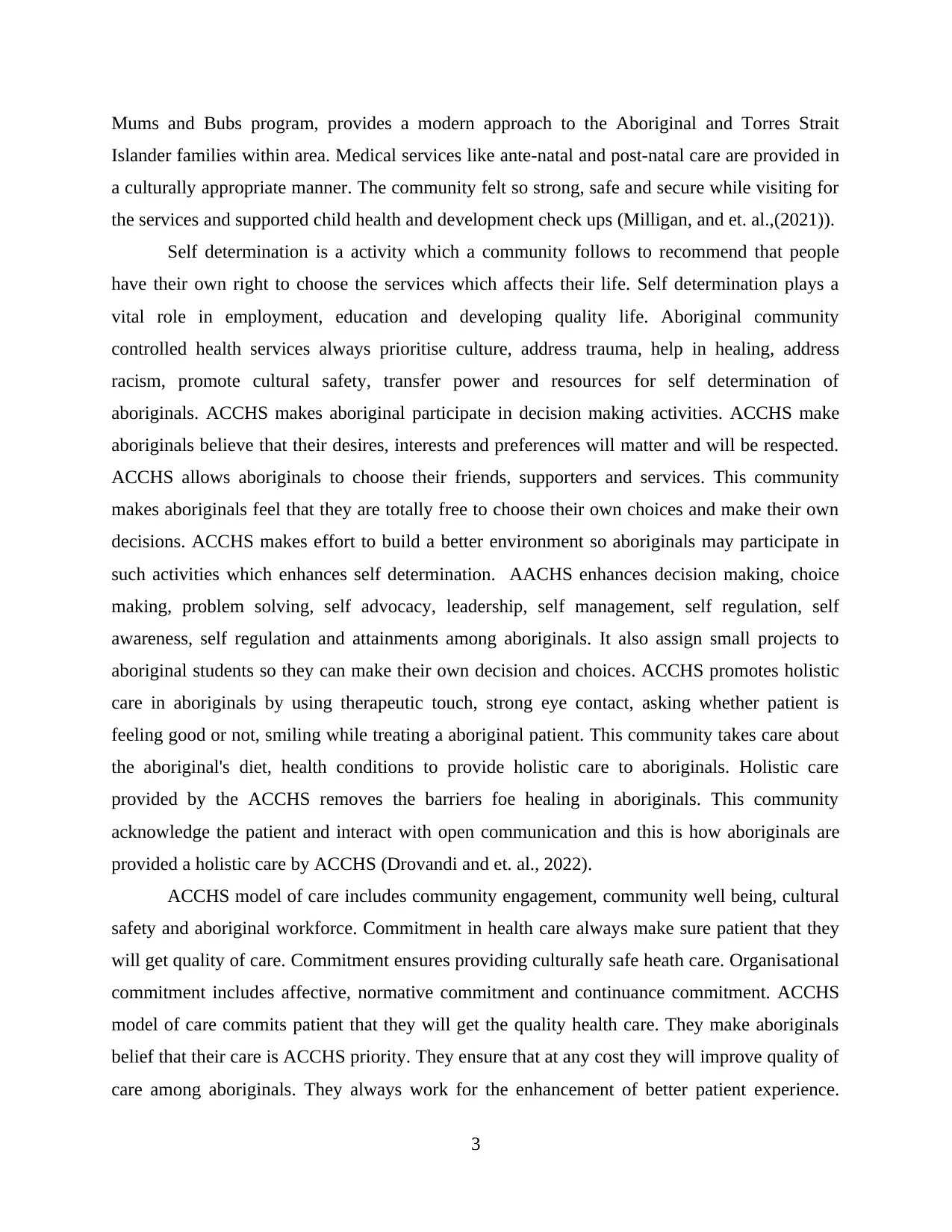
Mums and Bubs program, provides a modern approach to the Aboriginal and Torres Strait
Islander families within area. Medical services like ante-natal and post-natal care are provided in
a culturally appropriate manner. The community felt so strong, safe and secure while visiting for
the services and supported child health and development check ups (Milligan, and et. al.,(2021)).
Self determination is a activity which a community follows to recommend that people
have their own right to choose the services which affects their life. Self determination plays a
vital role in employment, education and developing quality life. Aboriginal community
controlled health services always prioritise culture, address trauma, help in healing, address
racism, promote cultural safety, transfer power and resources for self determination of
aboriginals. ACCHS makes aboriginal participate in decision making activities. ACCHS make
aboriginals believe that their desires, interests and preferences will matter and will be respected.
ACCHS allows aboriginals to choose their friends, supporters and services. This community
makes aboriginals feel that they are totally free to choose their own choices and make their own
decisions. ACCHS makes effort to build a better environment so aboriginals may participate in
such activities which enhances self determination. AACHS enhances decision making, choice
making, problem solving, self advocacy, leadership, self management, self regulation, self
awareness, self regulation and attainments among aboriginals. It also assign small projects to
aboriginal students so they can make their own decision and choices. ACCHS promotes holistic
care in aboriginals by using therapeutic touch, strong eye contact, asking whether patient is
feeling good or not, smiling while treating a aboriginal patient. This community takes care about
the aboriginal's diet, health conditions to provide holistic care to aboriginals. Holistic care
provided by the ACCHS removes the barriers foe healing in aboriginals. This community
acknowledge the patient and interact with open communication and this is how aboriginals are
provided a holistic care by ACCHS (Drovandi and et. al., 2022).
ACCHS model of care includes community engagement, community well being, cultural
safety and aboriginal workforce. Commitment in health care always make sure patient that they
will get quality of care. Commitment ensures providing culturally safe heath care. Organisational
commitment includes affective, normative commitment and continuance commitment. ACCHS
model of care commits patient that they will get the quality health care. They make aboriginals
belief that their care is ACCHS priority. They ensure that at any cost they will improve quality of
care among aboriginals. They always work for the enhancement of better patient experience.
3
Islander families within area. Medical services like ante-natal and post-natal care are provided in
a culturally appropriate manner. The community felt so strong, safe and secure while visiting for
the services and supported child health and development check ups (Milligan, and et. al.,(2021)).
Self determination is a activity which a community follows to recommend that people
have their own right to choose the services which affects their life. Self determination plays a
vital role in employment, education and developing quality life. Aboriginal community
controlled health services always prioritise culture, address trauma, help in healing, address
racism, promote cultural safety, transfer power and resources for self determination of
aboriginals. ACCHS makes aboriginal participate in decision making activities. ACCHS make
aboriginals believe that their desires, interests and preferences will matter and will be respected.
ACCHS allows aboriginals to choose their friends, supporters and services. This community
makes aboriginals feel that they are totally free to choose their own choices and make their own
decisions. ACCHS makes effort to build a better environment so aboriginals may participate in
such activities which enhances self determination. AACHS enhances decision making, choice
making, problem solving, self advocacy, leadership, self management, self regulation, self
awareness, self regulation and attainments among aboriginals. It also assign small projects to
aboriginal students so they can make their own decision and choices. ACCHS promotes holistic
care in aboriginals by using therapeutic touch, strong eye contact, asking whether patient is
feeling good or not, smiling while treating a aboriginal patient. This community takes care about
the aboriginal's diet, health conditions to provide holistic care to aboriginals. Holistic care
provided by the ACCHS removes the barriers foe healing in aboriginals. This community
acknowledge the patient and interact with open communication and this is how aboriginals are
provided a holistic care by ACCHS (Drovandi and et. al., 2022).
ACCHS model of care includes community engagement, community well being, cultural
safety and aboriginal workforce. Commitment in health care always make sure patient that they
will get quality of care. Commitment ensures providing culturally safe heath care. Organisational
commitment includes affective, normative commitment and continuance commitment. ACCHS
model of care commits patient that they will get the quality health care. They make aboriginals
belief that their care is ACCHS priority. They ensure that at any cost they will improve quality of
care among aboriginals. They always work for the enhancement of better patient experience.
3
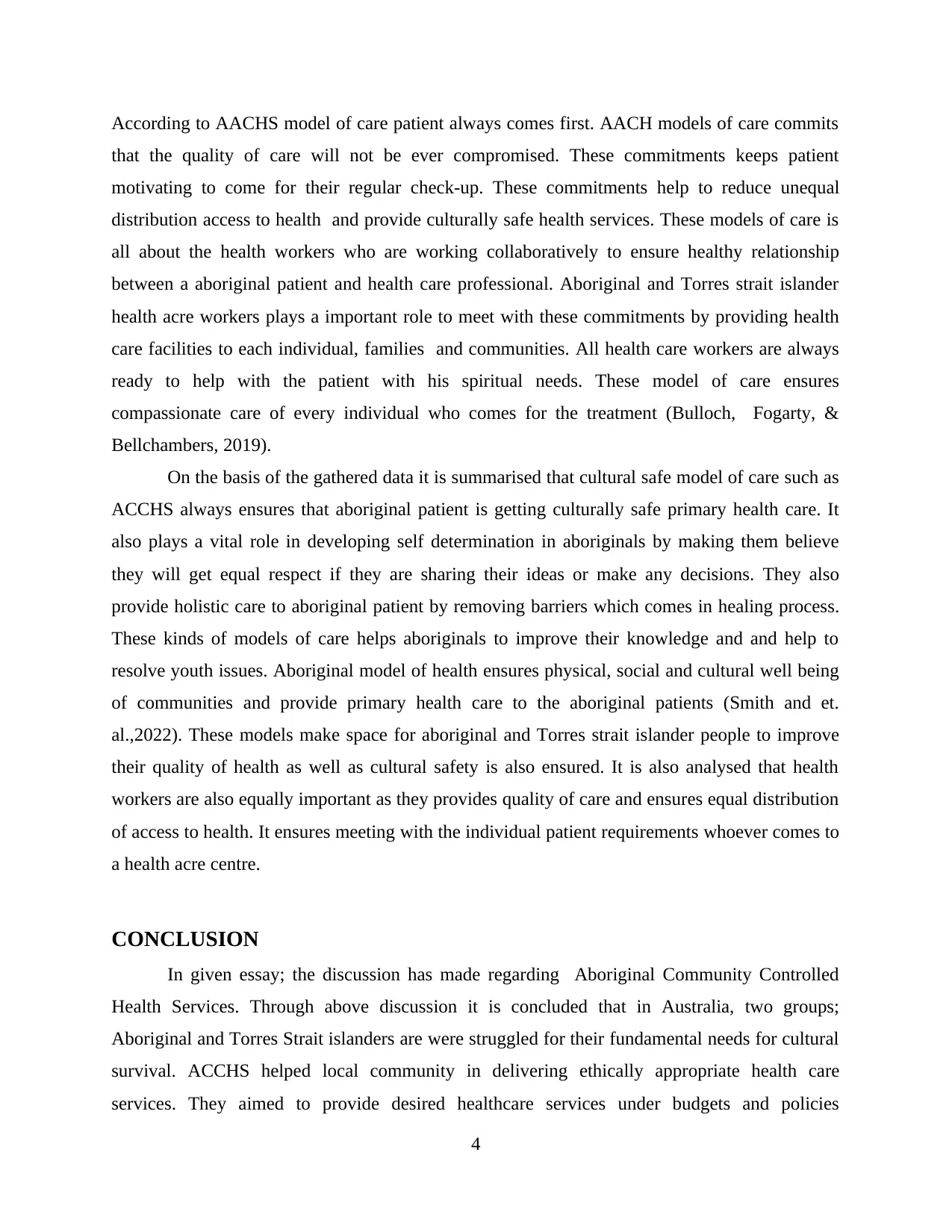
According to AACHS model of care patient always comes first. AACH models of care commits
that the quality of care will not be ever compromised. These commitments keeps patient
motivating to come for their regular check-up. These commitments help to reduce unequal
distribution access to health and provide culturally safe health services. These models of care is
all about the health workers who are working collaboratively to ensure healthy relationship
between a aboriginal patient and health care professional. Aboriginal and Torres strait islander
health acre workers plays a important role to meet with these commitments by providing health
care facilities to each individual, families and communities. All health care workers are always
ready to help with the patient with his spiritual needs. These model of care ensures
compassionate care of every individual who comes for the treatment (Bulloch, Fogarty, &
Bellchambers, 2019).
On the basis of the gathered data it is summarised that cultural safe model of care such as
ACCHS always ensures that aboriginal patient is getting culturally safe primary health care. It
also plays a vital role in developing self determination in aboriginals by making them believe
they will get equal respect if they are sharing their ideas or make any decisions. They also
provide holistic care to aboriginal patient by removing barriers which comes in healing process.
These kinds of models of care helps aboriginals to improve their knowledge and and help to
resolve youth issues. Aboriginal model of health ensures physical, social and cultural well being
of communities and provide primary health care to the aboriginal patients (Smith and et.
al.,2022). These models make space for aboriginal and Torres strait islander people to improve
their quality of health as well as cultural safety is also ensured. It is also analysed that health
workers are also equally important as they provides quality of care and ensures equal distribution
of access to health. It ensures meeting with the individual patient requirements whoever comes to
a health acre centre.
CONCLUSION
In given essay; the discussion has made regarding Aboriginal Community Controlled
Health Services. Through above discussion it is concluded that in Australia, two groups;
Aboriginal and Torres Strait islanders are were struggled for their fundamental needs for cultural
survival. ACCHS helped local community in delivering ethically appropriate health care
services. They aimed to provide desired healthcare services under budgets and policies
4
that the quality of care will not be ever compromised. These commitments keeps patient
motivating to come for their regular check-up. These commitments help to reduce unequal
distribution access to health and provide culturally safe health services. These models of care is
all about the health workers who are working collaboratively to ensure healthy relationship
between a aboriginal patient and health care professional. Aboriginal and Torres strait islander
health acre workers plays a important role to meet with these commitments by providing health
care facilities to each individual, families and communities. All health care workers are always
ready to help with the patient with his spiritual needs. These model of care ensures
compassionate care of every individual who comes for the treatment (Bulloch, Fogarty, &
Bellchambers, 2019).
On the basis of the gathered data it is summarised that cultural safe model of care such as
ACCHS always ensures that aboriginal patient is getting culturally safe primary health care. It
also plays a vital role in developing self determination in aboriginals by making them believe
they will get equal respect if they are sharing their ideas or make any decisions. They also
provide holistic care to aboriginal patient by removing barriers which comes in healing process.
These kinds of models of care helps aboriginals to improve their knowledge and and help to
resolve youth issues. Aboriginal model of health ensures physical, social and cultural well being
of communities and provide primary health care to the aboriginal patients (Smith and et.
al.,2022). These models make space for aboriginal and Torres strait islander people to improve
their quality of health as well as cultural safety is also ensured. It is also analysed that health
workers are also equally important as they provides quality of care and ensures equal distribution
of access to health. It ensures meeting with the individual patient requirements whoever comes to
a health acre centre.
CONCLUSION
In given essay; the discussion has made regarding Aboriginal Community Controlled
Health Services. Through above discussion it is concluded that in Australia, two groups;
Aboriginal and Torres Strait islanders are were struggled for their fundamental needs for cultural
survival. ACCHS helped local community in delivering ethically appropriate health care
services. They aimed to provide desired healthcare services under budgets and policies
4
⊘ This is a preview!⊘
Do you want full access?
Subscribe today to unlock all pages.

Trusted by 1+ million students worldwide
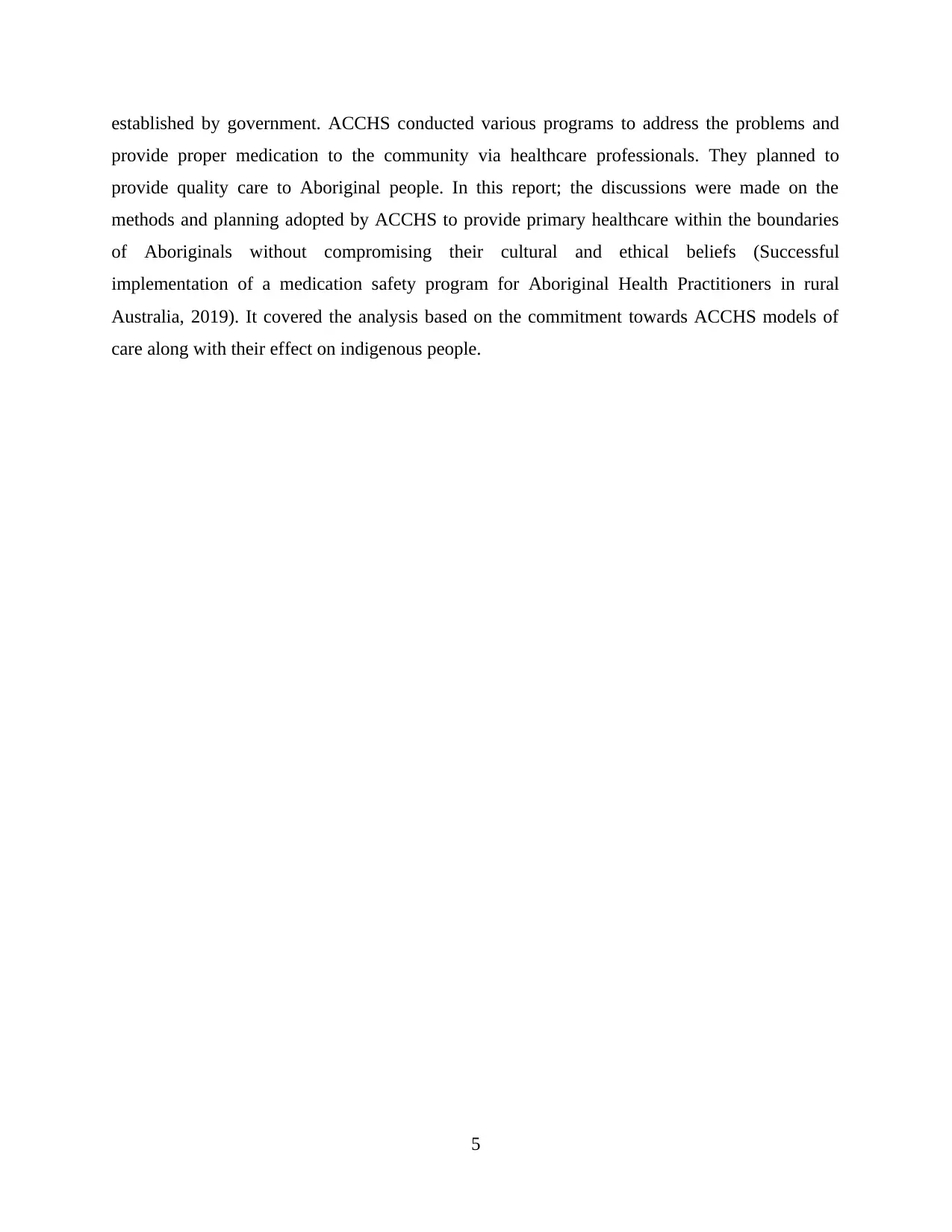
established by government. ACCHS conducted various programs to address the problems and
provide proper medication to the community via healthcare professionals. They planned to
provide quality care to Aboriginal people. In this report; the discussions were made on the
methods and planning adopted by ACCHS to provide primary healthcare within the boundaries
of Aboriginals without compromising their cultural and ethical beliefs (Successful
implementation of a medication safety program for Aboriginal Health Practitioners in rural
Australia, 2019). It covered the analysis based on the commitment towards ACCHS models of
care along with their effect on indigenous people.
5
provide proper medication to the community via healthcare professionals. They planned to
provide quality care to Aboriginal people. In this report; the discussions were made on the
methods and planning adopted by ACCHS to provide primary healthcare within the boundaries
of Aboriginals without compromising their cultural and ethical beliefs (Successful
implementation of a medication safety program for Aboriginal Health Practitioners in rural
Australia, 2019). It covered the analysis based on the commitment towards ACCHS models of
care along with their effect on indigenous people.
5
Paraphrase This Document
Need a fresh take? Get an instant paraphrase of this document with our AI Paraphraser
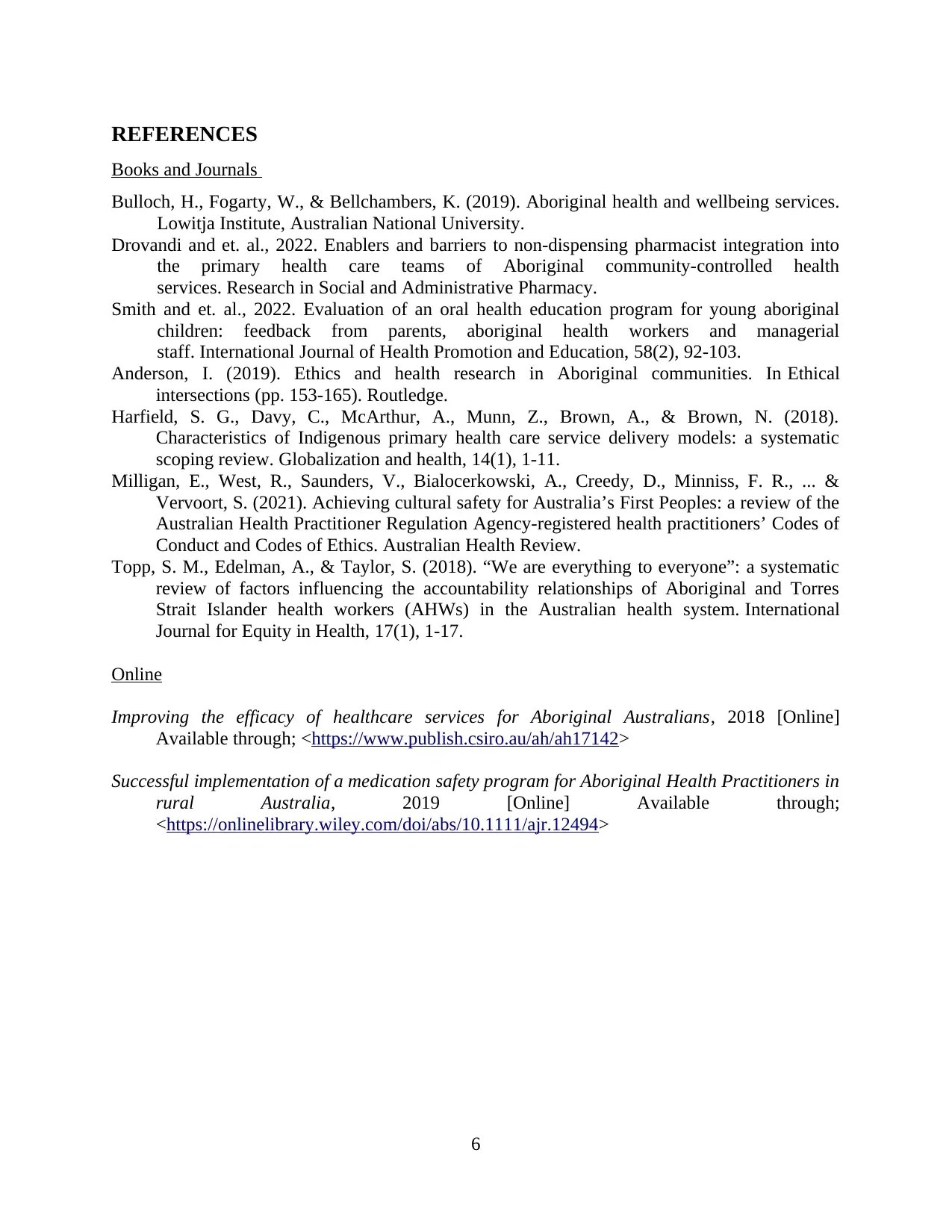
REFERENCES
Books and Journals
Bulloch, H., Fogarty, W., & Bellchambers, K. (2019). Aboriginal health and wellbeing services.
Lowitja Institute, Australian National University.
Drovandi and et. al., 2022. Enablers and barriers to non-dispensing pharmacist integration into
the primary health care teams of Aboriginal community-controlled health
services. Research in Social and Administrative Pharmacy.
Smith and et. al., 2022. Evaluation of an oral health education program for young aboriginal
children: feedback from parents, aboriginal health workers and managerial
staff. International Journal of Health Promotion and Education, 58(2), 92-103.
Anderson, I. (2019). Ethics and health research in Aboriginal communities. In Ethical
intersections (pp. 153-165). Routledge.
Harfield, S. G., Davy, C., McArthur, A., Munn, Z., Brown, A., & Brown, N. (2018).
Characteristics of Indigenous primary health care service delivery models: a systematic
scoping review. Globalization and health, 14(1), 1-11.
Milligan, E., West, R., Saunders, V., Bialocerkowski, A., Creedy, D., Minniss, F. R., ... &
Vervoort, S. (2021). Achieving cultural safety for Australia’s First Peoples: a review of the
Australian Health Practitioner Regulation Agency-registered health practitioners’ Codes of
Conduct and Codes of Ethics. Australian Health Review.
Topp, S. M., Edelman, A., & Taylor, S. (2018). “We are everything to everyone”: a systematic
review of factors influencing the accountability relationships of Aboriginal and Torres
Strait Islander health workers (AHWs) in the Australian health system. International
Journal for Equity in Health, 17(1), 1-17.
Online
Improving the efficacy of healthcare services for Aboriginal Australians, 2018 [Online]
Available through; <https://www.publish.csiro.au/ah/ah17142>
Successful implementation of a medication safety program for Aboriginal Health Practitioners in
rural Australia, 2019 [Online] Available through;
<https://onlinelibrary.wiley.com/doi/abs/10.1111/ajr.12494>
6
Books and Journals
Bulloch, H., Fogarty, W., & Bellchambers, K. (2019). Aboriginal health and wellbeing services.
Lowitja Institute, Australian National University.
Drovandi and et. al., 2022. Enablers and barriers to non-dispensing pharmacist integration into
the primary health care teams of Aboriginal community-controlled health
services. Research in Social and Administrative Pharmacy.
Smith and et. al., 2022. Evaluation of an oral health education program for young aboriginal
children: feedback from parents, aboriginal health workers and managerial
staff. International Journal of Health Promotion and Education, 58(2), 92-103.
Anderson, I. (2019). Ethics and health research in Aboriginal communities. In Ethical
intersections (pp. 153-165). Routledge.
Harfield, S. G., Davy, C., McArthur, A., Munn, Z., Brown, A., & Brown, N. (2018).
Characteristics of Indigenous primary health care service delivery models: a systematic
scoping review. Globalization and health, 14(1), 1-11.
Milligan, E., West, R., Saunders, V., Bialocerkowski, A., Creedy, D., Minniss, F. R., ... &
Vervoort, S. (2021). Achieving cultural safety for Australia’s First Peoples: a review of the
Australian Health Practitioner Regulation Agency-registered health practitioners’ Codes of
Conduct and Codes of Ethics. Australian Health Review.
Topp, S. M., Edelman, A., & Taylor, S. (2018). “We are everything to everyone”: a systematic
review of factors influencing the accountability relationships of Aboriginal and Torres
Strait Islander health workers (AHWs) in the Australian health system. International
Journal for Equity in Health, 17(1), 1-17.
Online
Improving the efficacy of healthcare services for Aboriginal Australians, 2018 [Online]
Available through; <https://www.publish.csiro.au/ah/ah17142>
Successful implementation of a medication safety program for Aboriginal Health Practitioners in
rural Australia, 2019 [Online] Available through;
<https://onlinelibrary.wiley.com/doi/abs/10.1111/ajr.12494>
6
1 out of 8
Related Documents
Your All-in-One AI-Powered Toolkit for Academic Success.
+13062052269
info@desklib.com
Available 24*7 on WhatsApp / Email
![[object Object]](/_next/static/media/star-bottom.7253800d.svg)
Unlock your academic potential
Copyright © 2020–2025 A2Z Services. All Rights Reserved. Developed and managed by ZUCOL.





